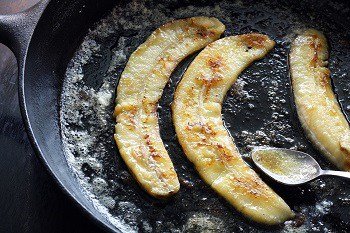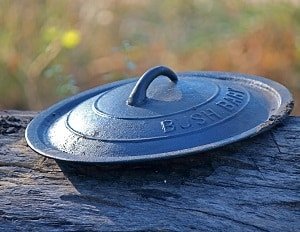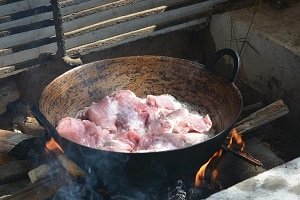 When camping, cooking is one thing that you can’t avoid, at least not if you’re luxury camping. Many people, especially when camping in an RV take full meals, coolers, and even grills.
When camping, cooking is one thing that you can’t avoid, at least not if you’re luxury camping. Many people, especially when camping in an RV take full meals, coolers, and even grills.
So is cast iron good for camping?
When properly seasoned and cared for cast iron is great for camping. Cast iron is an excellent choice in camping cooking because of it’s ability to distribute heat, durability to high temperatures and when seasoned properly, cast iron is virtual non-stick. Add all this together and cast iron is good for any type of campsite cooking that you will need to do.
Be sure to keep reading to find out everything you will need to know about cooking with cast iron.
Once you finish this article find out more about what you can cook with on a campfire with this article that we wrote- Find Out What Skillets to Use On A Campfire And How To Use Them
Here’s what we will cover to make sure your a cast iron camp cooking pro.
Clickable Table Of Contents
Benefits of Using Cast Iron
There are many reasons that cast iron is good for camping. Cast iron is a very old-fashioned type of cookware that has been used for centuries, and it has kept an excellent reputation since day one. If you’re considering cast iron for camping, there are several things to consider.
What type of meals you’re going to be cooking, what method of heat will you be using, and what kind of camping you’ll be doing are all significant things to consider when choosing cookware. Some means of heat work with specific pans and cast iron is way too heavy for camping in which you will be walking a lot.
Cast iron is one of the most durable types of cookware that you can get for camping as long as you properly care for it. If not taken care of, cracks or fractures will appear on your skillet or pan. Cast iron also must be properly seasoned before use to ensure that it maintains its non-stick properties.
Cons of Using Cast Iron
One disadvantage of cast iron is that it gets hot-spots. This simply means that the skillet does not heat evenly, and the area directly over the flame will be significantly hotter than the rest of the cooking surface. This isn’t a bad issue over hot coals as much as it is when cooking on a stove.
Although hot-spots are a disadvantage, cast iron retains heat better than any other skillet. If you’re preparing food for multiple people, who may be eating at different times, this is a significant advantage over other pans, as it will keep your food hotter, longer.
Weight is another disadvantage of cast iron. Cast iron is one of the heaviest types of skillets on the market, and the average skillet (12″) can weigh over eight pounds! If you’re backpacking, you should consider another type of skillet.

In Which Type of Camping is Cast Iron Best?
If you choose cast iron, you must know which type of camping in which it is best. Weight is a critical factor in many kinds of camping, so if you have to carry your gear with you for a long-distance, you may want to consider an alternative. Stainless steel, carbon steel, and even some aluminum pans will be much lighter for situations in which you have to carry your gear a long distance.
If you’re camping in an RV, camper trailer, or tent camping near your vehicle, cast iron might be perfect for you. A 12-inch cast iron skillet can weigh over eight pounds, so you won’t want to have to carry it far.
Seasoning Your Cast Iron Skillet
Seasoning your skillet can make or break how well you can cook on it, as well as how long your skillet will last. A skillet that hasn’t been appropriately seasoned will not continue to be non-stick, will not be easy to clean, and will crack over time.
To season your skillet, coat the entire pan with a thin layer of cooking oil or shortening. Once coated, place the skillet, upside down, in the oven at 350 degrees for one hour. Place a cookie sheet on the lower rack to catch any grease that may drip from the pan in the heating process. When you remove it from the oven, let it cool to a warm temperature, wipe the excess oil off the pan, and it’s ready to use!
If you do not season your skillet before you get to the campsite, don’t fret! You can season your skillet over an open fire by rubbing oil or shortening on to the cooking surface, placing the pan in the fire, and allowing to heat until the oil begins to smoke. Again, remove the pan from the heat, let it cool to a warm temperature, and wipe the excess oil from the pan.
Seasoning will have to be done on occasion, but as long as you clean your skillet properly, it will not have to be done often. Each time you cook with your pan, the non-stick layer that has been created by seasoning will become more and more effective.
If you want to avoid long preparation, you can purchase seasoned cast iron, steel, and carbon steel skillets. Although this is a bit of an easier option in the beginning, the pan may need to be re-seasoned after a few uses.
Caring for Cast Iron Skillets
Cleaning your cast iron skillet properly is crucial to keeping your cookware in excellent condition. To prevent build up and dried on food, always make sure to wash your pan immediately after use. If you have burned on food, use a mild, non-abrasive sponge, and coarse sea salt and water mixture to break up the food.
Never soak your cast iron. Soaking the skillet in water can, and will, cause rust at a much more rapid rate than you would think. Always rinse and dry thoroughly when cleaning up after cooking.
Most people say to “never use soap on your cast iron.” Dishwashing detergents are designed to cut grease, which will reverse the seasoning process that you did before you used your pan. If you do feel like the skillet is too dirty and needs a deep scrub, there’s nothing wrong with a good hot, soapy scrub. However, it should not be necessary after each use. Thoroughly dry the pan before putting it away. If you find the need to clean your pan in this manner, it will need to be re-seasoned before it’s next use.
Things to Avoid When Choosing Cast Iron Cookware
There are many things that you should avoid when choosing cookware for camping. While any type will work, there are chemicals in non-stick cookware that can be harmful if used on an open flame or camp stove. Always read the manufacturer’s recommendations when purchasing a skillet or pan. While some pans can be used on open fire, gas, or electric, sometimes they can only be used on one type of heat source.
Non-stick coatings are a serious thing to avoid for several reasons. Many non-stick surfaces can be harmful to your health if heated too much or too quickly. Although they have no odor and you cannot see them, these coatings can release fumes when not used on a controlled-heat stove.
In addition to the fumes, most non-stick pans require specific utensils to avoid scratching or chipping the coating off into your food. Breathing in fumes is definitely bad, but it’s even worse if the coating is literally in your dinner.
Aluminum skillets are one type of skillet to avoid when you plan to cook over an open fire. The typical temperature of a campfire is around 2,000 degrees Fahrenheit, which is about 800 degrees more than it takes to melt aluminum. No one wants melted aluminum in their food! Check the ratings of your camp stove as well. Although it is an open flame, you have more control over how large the fire is.
Cast iron is excellent for camping as long as you don’t have to carry your gear any long distance. If you’re camping in a car, RV, or camp trailer, cast iron may be an excellent option for you. If you’re planning on backpacking or hiking with your skillet, you may want to consider steel, carbon steel, or a camp stove system.
When you finish this article, learn about different foods and methods use to cook on a campfire with this article that we wrote.
What can you cook on a campfire? ( Meats, Veggies, Sandwiches and more )

Alternatives to Cast Iron
There are many alternatives to cast iron, and some even perform as well or better according to some people. Preference and cooking style has a lot to do with others’ opinions.
Can you use steel skillets while camping?
Yes, if you choose a high-quality steel skillet and properly season it, you can use a steel skillet while camping.
Steel skillets are amongst the most common type of skillet or pan on the market. Steel is usually inexpensive and can be purchased almost anywhere. The only issue with how easily steel skillets can be found is that it makes it harder to find a high-quality skillet. There are many flimsy options on the market.
Although many of these options are inexpensive and maybe flimsy, that may work for you in the long run. While it is nice to have luxury cookware, you may not want to cook over a fire with that pricey gear.
Can you use carbon steel skillets for camping?
Yes, Carbon steel is somewhat of a crossover between steel can cast iron and maybe a great option for you. Carbon steel tends to heat a little bit more evenly, as well as heats up more quickly than cast iron. Although this isn’t a deal-breaker for many people, it is much lighter than cast iron.
Carbon steel must be seasoned, just as you season your cast iron. You can purchase pre-season seasoned carbon steel, but it may need to be re-seasoned after several uses.
Can you use aluminum skillets for camping?
Yes, aluminum can be used for camping, but it is highly recommended that you do not use it over a campfire.
Aluminum is often used by hiking campers or backcountry campers because it is light and since it heats evenly, aluminum also saves cooking fuel when out in the wilderness.
The downside of using aluminum is often it is not as durable as cast iron or carbon steel skillets.
Camp Cooking Systems
There are many different types of cook systems on the market for camping while cooking that avoid the need for skillets, pots, and pans. Although these options are usually geared towards backpacking, they could save a lot of money, time, and headache if you don’t need a skillet specifically.
If you only need to boil water, you could consider something like the Jetboil Camp Stove. This type of camp stove is a self-contained unit that includes the stove, fuel, and pot to boil the water. This stove is excellent for coffee, tea, soups, and instant backpacking meals.
Other camp stoves have specific skillets that are designed to work with the camp stove. These skillets have engineered heat distribution systems, non-stick properties that are safe to use with the camp stove, and even detachable handles so you can use the skillet as a plate to avoid carrying extra gear.
More articles we think you will love. Go ahead try one.
Ice In A Cooler (How long does it last, Tips to last longer)
How Do You Heat Water While Camping?
What Kind of Skillets Can You Use on a Campfire?
How to store food in bear country.
What can you cook on a campfire?
Tabletop camping stove (Best, Advantages, Types, Care)
